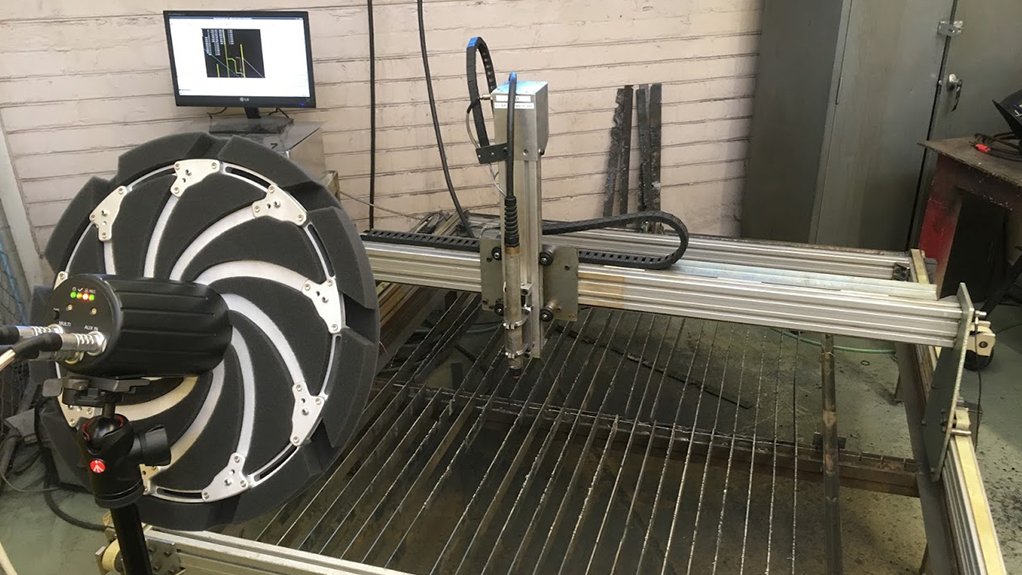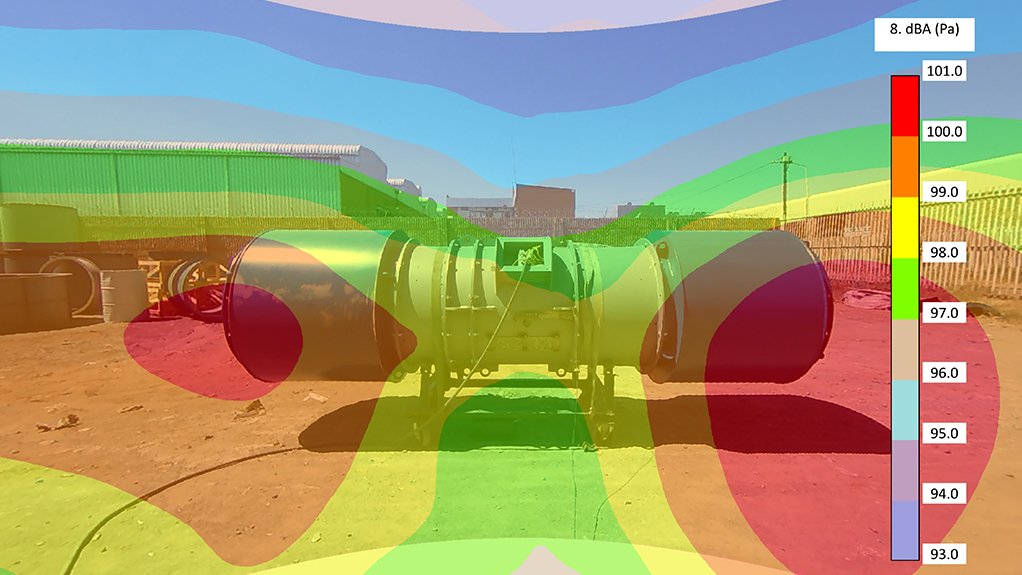Centre’s expertise can improve asset testing



SPECIALIST TESTING CAPABILITIES C-AIM provides engineering consulting services to assist industry in optimally managing the structural integrity of physical assets over their life cycles
NOVEL TECHNIQUES In a different application of signal processing, C-AIM can also use multiple microphones to obtain images of the acoustic field around a vibrating object
The Centre for Asset Integrity Management (C-AIM Consult), a business unit of research organisation Enterprises University of Pretoria (UP), can serve the local industry with key capabilities through its expertise in vibration-based condition monitoring and structural health monitoring.
“These capabilities include full-scale fatigue testing of large structures, component fatigue testing and static testing, as well as shock and vibration testing,” says C-AIM director Stephan Heyns.
He explains that this is possible, owing to its advanced capabilities with regard to the reconstruction of dynamic multi-axis responses in the laboratory test rigs, fatigue analysis and field measurements, in combination with its extensive hydraulic and electrodynamic test infrastructure.
Enterprises UP was established to develop a formal structure to organise the university’s external research and continuing education interactions with the private sector and government.
C-AIM is a specialist research group that also provides specialist engineering consulting services to assist industry in optimally managing the structural integrity of physical assets over their life cycles using its range of sensitive seismic accelerometers, seatpad accelerometers and multi-channel data loggers.
Once data has been gathered, the assessments are performed using in-house developed and bespoke software routines.
Heyns explains that the strained state of the local economy is forcing companies to be more reluctant in making new investments, particularly for vital physical assets.
He adds that this creates opportunities for C-AIM to increase the functionality and productivity of existing assets without replacing them.
“This entails the monitoring and processing of data to analyse performance data from assets, and then to continuously improve their performance. In some cases, it’s also important to improve the environmental and human impacts of such assets.”
At C-AIM, the analysis of vibration data from particularly complex assets, such as industrial gearboxes, has been a priority. Heyns highlights a challenge of some industrial gearboxes being that they do not run at a constant speed.
The loads and speeds of some gearboxes like wind turbine gearboxes continuously change owing to wind speed changes. This makes traditional monitoring techniques that rely on Fast Fourier transform algorithms used to convert a sequence of vibration signals to a simple-to-understand representation such as a graph over frequency, more difficult.
“C-AIM has developed novel signal-processing methodologies to address this, and has demonstrated their effectiveness on many simulated problems, as well as experimental data obtained from fault simulators, in our laboratories.”
He adds that this holds promise for application in mining, as costly gearboxes are often exposed to fluctuating loads, owing to changing operating conditions. C-AIM is working with a local partner in the mining industry to apply these techniques to large mills.
C-AIM has also developed novel techniques in the use of non-contact blade tip timing methods to assess the condition of turbomachinery blades while rotating, says Heyns. These techniques are appropriate for axial flow turbines and compressors.
In a different application of signal processing, C-AIM can also use multiple microphones to obtain images of the acoustic field around a vibrating object to help identify sound sources and improve vibrating systems’ acoustic design.
Enterprises UP has done multiple projects this year to identify noise sources on mining equipment.
While most of these techniques involve the use of new signal-processing techniques, C-AIM is also focusing on ways in which machine learning techniques can be applied in conjunction with these signal-processing techniques.
“We hope to be in a position soon to apply these to techniques for the detection of overload, and other anomalous behaviours in large costly machines.”
Machine Behaviour Visualisation
While signal processing and machine learning techniques are ideal for the long-term monitoring of large machines, Heyns argues that there are many cases where visualisation of machine behaviour is more appropriate.
He highlights rock drills in the mining industry as an example.
The drills are known to vibrate violently at frequencies that correspond to the operating frequencies of these machines. High-speed photography could be used to study the dynamic nature of such drills to improve design, as this provides insights that are difficult to obtain using ordinary accelerometers.
Cameras used for this purpose can sample at a rate of 4 000 frames per second at full resolution, which allows for studying high-frequency dynamic phenomena.
In another example of the use of high-speed photography, Heyns highlights two high-speed cameras that were used to obtain three-dimensional images of rail surfaces. Measurements could be done from a moving platform like a locomotive to obtain detailed images of the rail surface for condition monitoring purposes.
While such images provide a wealth of information, processing becomes time consuming for applications in areas such as rail condition monitoring.
“Using deep learning techniques does, however, provide potential solutions, whereby deep learning models can be executed quickly once trained.
“Companies can invest in young people willing to work in a research centre, such as C-AIM, to do research to solve their unique problems. Companies can also tap into expertise at the university using its specialised equipment and expertise through C-AIM Consult,” he concludes.
Article Enquiry
Email Article
Save Article
Feedback
To advertise email advertising@creamermedia.co.za or click here
Announcements
What's On
Subscribe to improve your user experience...
Option 1 (equivalent of R125 a month):
Receive a weekly copy of Creamer Media's Engineering News & Mining Weekly magazine
(print copy for those in South Africa and e-magazine for those outside of South Africa)
Receive daily email newsletters
Access to full search results
Access archive of magazine back copies
Access to Projects in Progress
Access to ONE Research Report of your choice in PDF format
Option 2 (equivalent of R375 a month):
All benefits from Option 1
PLUS
Access to Creamer Media's Research Channel Africa for ALL Research Reports, in PDF format, on various industrial and mining sectors
including Electricity; Water; Energy Transition; Hydrogen; Roads, Rail and Ports; Coal; Gold; Platinum; Battery Metals; etc.
Already a subscriber?
Forgotten your password?
Receive weekly copy of Creamer Media's Engineering News & Mining Weekly magazine (print copy for those in South Africa and e-magazine for those outside of South Africa)
➕
Recieve daily email newsletters
➕
Access to full search results
➕
Access archive of magazine back copies
➕
Access to Projects in Progress
➕
Access to ONE Research Report of your choice in PDF format
RESEARCH CHANNEL AFRICA
R4500 (equivalent of R375 a month)
SUBSCRIBEAll benefits from Option 1
➕
Access to Creamer Media's Research Channel Africa for ALL Research Reports on various industrial and mining sectors, in PDF format, including on:
Electricity
➕
Water
➕
Energy Transition
➕
Hydrogen
➕
Roads, Rail and Ports
➕
Coal
➕
Gold
➕
Platinum
➕
Battery Metals
➕
etc.
Receive all benefits from Option 1 or Option 2 delivered to numerous people at your company
➕
Multiple User names and Passwords for simultaneous log-ins
➕
Intranet integration access to all in your organisation




















